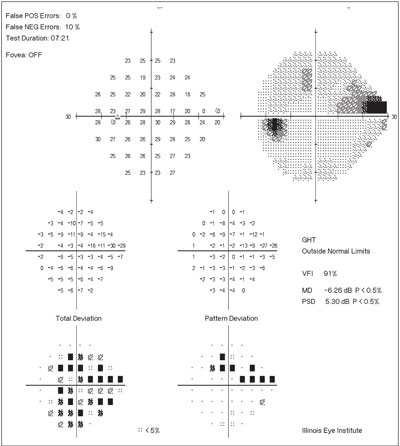 |
|
Those with VI have a higher risk of dementia. Image courtesy of Michael Chaglasian, OD. Click image to enlarge. |
The number of people living with visual impairment (VI) or dementia is expected to soar within the coming decades. While these are two very distinct issues, researchers have been uncovering more and more in recent years about the relationship between VI and cognitive decline. One recent study found an association between VI and risk of dementia, observing a progressively greater risk among people with worse visual acuity.
The analyzed results of the UK Biobank Study included 117,187 volunteers (ages 40 through 69) with no dementia at baseline. Just 4,018 (3.4%) participants had VI, while the remaining made up the non-VI group. The average follow-up duration was six years.
By the end of the study period, 438 participants were classified as having dementia. Those who had VI at baseline were more likely to develop the syndrome, demonstrating a 78%-higher risk of dementia in the presence of VI. In addition, dementia risk increased with VI severity.
Though the link between VI and dementia is far from being clearly understood, there have been many speculations from research that aim to define their interconnected relationship.
“Firstly, it has been suggested that VI may be one of the first manifestations of dementia,” the researchers noted. “Secondly, visually impaired individuals may place more stress on neural resources to optimally perform visual tasks, thus increasing the cognitive loads. Alternatively, based on the visual deprivation hypothesis, reduced visual inputs and stimulation may compromise cognitive efficiency.
“It remains possible that the association between VI and dementia may be due to the intermediate factors,” the researchers continue. “For instance, visually impaired individuals were more prone to social isolation, which in turn may predispose to depression, a significant risk factor for dementia.”
Additional risk factors for dementia in this study population included non-white ethnicity, older age, fewer years of education, living in a socioeconomically deprived area, physical activity level, family history of dementia and depression and/or diabetes at baseline.
The trend toward higher dementia risk across VI severity groups highlights the importance of regular vision and health screenings, especially for the elderly. Preventing VI from increasing in severity may help delay the onset of dementia or slow its progression, as suggested from the findings of this study. Encourage your visually impaired patients, especially those of older age or with other risk factors of dementia, to continue being seen in the office regularly to monitor the status of their condition, the investigators concluded.
Zhu Z, Shi D, Liao H, et al. Visual impairment and risk of dementia: the UK Biobank Study. Am J Ophthalmol. August 11, 2021. [Epub ahead of print]. |

